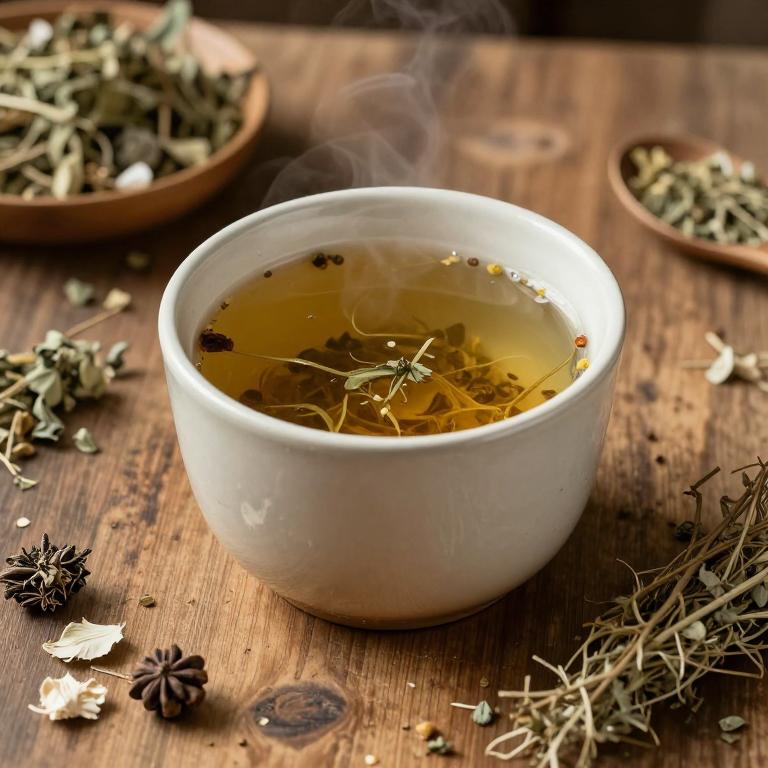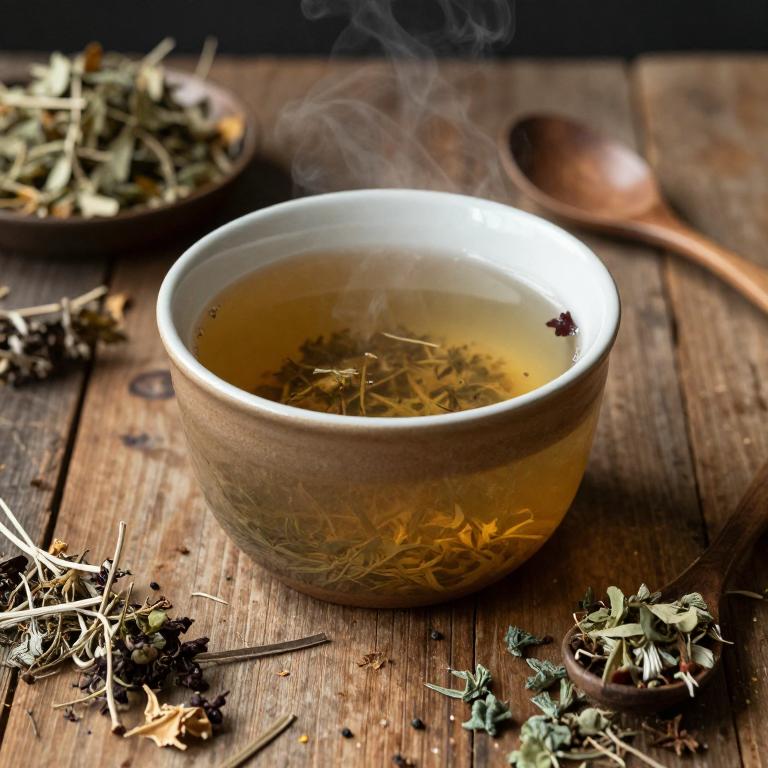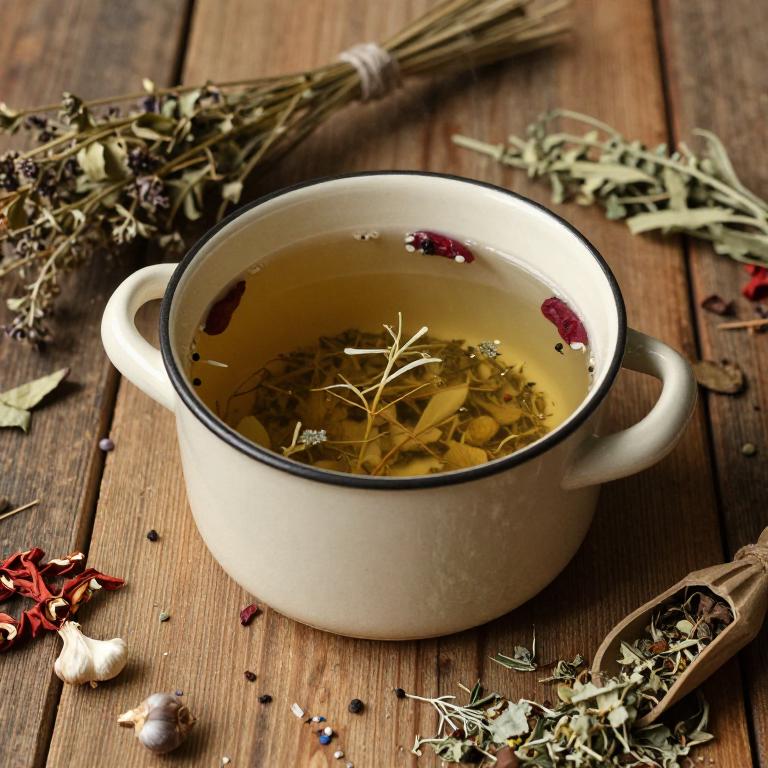10 Best Herbal Decoctions For Acute Bronchitis

Herbal decoctions have been traditionally used to alleviate symptoms of acute bronchitis by supporting respiratory health and reducing inflammation.
Commonly used herbs include eucalyptus, thyme, and ivy, which are known for their expectorant and antimicrobial properties. To prepare a decoction, these herbs are typically simmered in water for several minutes to extract their active compounds. The steam from the decoction or the liquid itself can be inhaled to help loosen mucus and soothe irritated airways.
While herbal decoctions may provide relief, they should not replace medical advice, and individuals with severe symptoms should consult a healthcare professional.
Table of Contents
- 1. Thyme (Thymus vulgaris)
- 2. Peppermint (Mentha piperita)
- 3. Scots pine (Pinus sylvestris)
- 4. Eucalyptus (Eucalyptus globulus)
- 5. Ginger (Zingiber officinale)
- 6. Chamomile (Matricaria chamomilla)
- 7. Salvia (Salvia officinalis)
- 8. Fennel (Foeniculum vulgare)
- 9. Ceylon cinnamon (Cinnamomum verum)
- 10. Stinging nettle (Urtica dioica)
1. Thyme (Thymus vulgaris)

Thymus vulgaris, commonly known as thyme, has been traditionally used in herbal medicine for its antimicrobial and anti-inflammatory properties.
Herbal decoctions made from thyme are often prepared by steeping the dried leaves and flowers in hot water, creating a potent tea that can be consumed several times a day. These decoctions are believed to help alleviate symptoms of acute bronchitis by reducing mucus production and soothing irritated airways. The essential oils in thyme, particularly thymol, contribute to its effectiveness in fighting respiratory infections.
While thyme decoctions are generally considered safe, it is advisable to consult a healthcare provider before using them, especially for individuals with underlying health conditions or those taking other medications.
2. Peppermint (Mentha piperita)

Mentha piperita, commonly known as peppermint, is often used in herbal decoctions to alleviate symptoms of acute bronchitis due to its antispasmodic and expectorant properties.
The preparation involves steeping dried peppermint leaves in hot water to create a soothing herbal tea, which can help reduce coughing and ease respiratory discomfort. Peppermint's menthol content may provide a cooling effect that soothes irritated airways and promotes easier breathing. While generally considered safe for short-term use, it is important to consult a healthcare provider before using peppermint decoctions, especially for individuals with certain medical conditions or those taking other medications.
Overall, peppermint herbal decoctions can serve as a complementary therapy to support recovery from acute bronchitis.
3. Scots pine (Pinus sylvestris)

Pinus sylvestris, commonly known as Scots pine, has been traditionally used in herbal medicine for its potential respiratory benefits, including the treatment of acute bronchitis.
The resin and needles of the pine tree are often prepared into a decoction by simmering them in water, which is believed to help soothe inflamed airways and reduce mucus production. This herbal remedy is thought to possess anti-inflammatory and antimicrobial properties that may support the body's natural healing processes during a bronchial infection. While some studies suggest that pine resin may help alleviate symptoms, it is important to consult a healthcare provider before using it as a complementary therapy, especially for individuals with existing health conditions or those taking other medications.
Overall, Pinus sylvestris decoctions may offer a natural approach to managing acute bronchitis, though they should not replace conventional medical treatment.
4. Eucalyptus (Eucalyptus globulus)

Eucalyptus globulus, commonly known as eucalyptus or gum tree, is often used in herbal decoctions to support respiratory health.
The leaves of this plant contain compounds such as eucalyptol, which have been shown to possess antimicrobial and anti-inflammatory properties. When prepared as a herbal decoction, eucalyptus globulus can help alleviate symptoms of acute bronchitis by reducing mucus production and easing breathing. It is typically brewed by simmering the dried leaves in water for several minutes to extract the active components.
While it may provide relief, it is important to consult a healthcare professional before using it as a treatment, especially for individuals with existing health conditions or those taking other medications.
5. Ginger (Zingiber officinale)

Zingiber officinale, commonly known as ginger, has been traditionally used in herbal medicine for its anti-inflammatory and bronchodilatory properties.
Herbal decoctions made from fresh or dried ginger roots are often prepared by simmering the plant material in water to extract its active compounds, such as gingerol and shogaol. These decoctions are believed to help alleviate symptoms of acute bronchitis by reducing coughing, easing mucus production, and soothing irritated airways. The warming and stimulating effects of ginger may also support immune function and promote overall respiratory health.
While ginger is generally safe for most people, it is advisable to consult a healthcare provider before using it as a treatment, especially for those with existing health conditions or taking medications.
6. Chamomile (Matricaria chamomilla)

Matricaria chamomilla, commonly known as chamomile, is often used in herbal decoctions for its anti-inflammatory and soothing properties.
When prepared as a decoction, chamomile can help alleviate symptoms of acute bronchitis by reducing inflammation in the airways and easing coughing. The active compounds in chamomile, such as flavonoids and essential oils, contribute to its expectorant and antimicrobial effects. While it is generally considered safe, it should be used with caution in individuals with allergies to plants in the Asteraceae family.
As a complementary therapy, chamomile decoctions may support recovery when used alongside conventional medical treatments for acute bronchitis.
7. Salvia (Salvia officinalis)

Salvia officinalis, commonly known as sage, has been traditionally used in herbal medicine for its potential therapeutic effects on respiratory conditions such as acute bronchitis.
Herbal decoctions made from dried sage leaves are often prepared by simmering the leaves in water to extract their active compounds, including flavonoids and essential oils, which may have anti-inflammatory and antimicrobial properties. These decoctions are believed to help reduce mucus production and soothe irritated airways, offering relief from coughing and congestion associated with acute bronchitis. While some studies suggest sage may support respiratory health, more research is needed to confirm its efficacy and safety in treating this condition.
As with any herbal remedy, it is advisable to consult a healthcare professional before using sage decoctions, especially for individuals with pre-existing medical conditions or those taking other medications.
8. Fennel (Foeniculum vulgare)

Foeniculum vulgare, commonly known as fennel, has been traditionally used in herbal medicine for its potential therapeutic effects on respiratory conditions such as acute bronchitis.
A fennel herbal decoction, prepared by boiling the seeds or leaves in water, is often consumed to help alleviate symptoms like coughing, mucus production, and inflammation in the airways. The essential oils in fennel, particularly anethol, possess antispasmodic and expectorant properties that may support the clearance of mucus and soothe bronchial irritation. While some studies suggest that fennel may offer mild relief for respiratory discomfort, it is important to consult a healthcare professional before using it as a treatment for acute bronchitis, especially in conjunction with other medications.
Overall, fennel decoctions can be a complementary remedy, but they should not replace conventional medical care for more severe or persistent cases.
9. Ceylon cinnamon (Cinnamomum verum)

Cinnamomum verum, commonly known as true cinnamon, has been traditionally used in herbal medicine for its anti-inflammatory and antimicrobial properties.
Herbal decoctions made from the bark of Cinnamomum verum are often prepared by simmering the bark in water to extract its active compounds, such as cinnamaldehyde and eugenol. These decoctions may help alleviate symptoms of acute bronchitis by reducing inflammation in the airways and potentially inhibiting respiratory tract infections. While some studies suggest that cinnamon may support respiratory health, it should not replace prescribed medical treatments for acute bronchitis.
It is important to consult a healthcare provider before using cinnamon decoctions, especially for individuals with allergies or those taking other medications.
10. Stinging nettle (Urtica dioica)

Urtica dioica, commonly known as stinging nettle, has been traditionally used in herbal medicine for its anti-inflammatory and expectorant properties.
A decoction of Urtica dioica can be prepared by boiling the fresh or dried leaves and stems in water for several minutes, then straining the liquid for consumption. This herbal preparation may help alleviate symptoms of acute bronchitis by reducing mucus viscosity and soothing irritated airways. Some studies suggest that the high concentration of minerals and antioxidants in stinging nettle may support respiratory health.
However, it is important to consult a healthcare provider before using Urtica dioica, especially for individuals with allergies or those taking other medications.